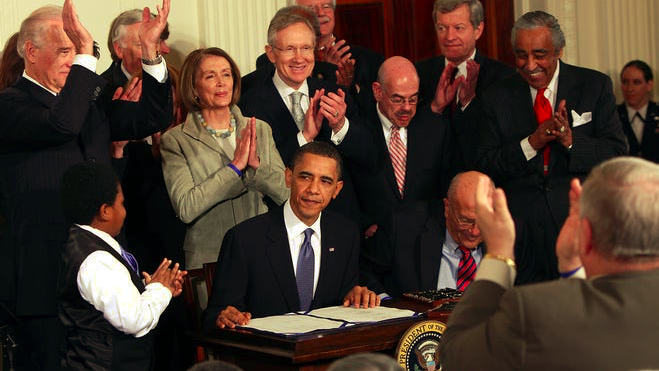
As the United States edges toward 30 million reported cases of COVID-19 this week, the Affordable Care Act (ACA) celebrates its 11th year. On March 23rd, 2010, President Barack Obama signed the landmark legislation into law as the most sweeping reform in healthcare since the 1965 enactment of Medicare and Medicaid. The Affordable Care Act brought the number of uninsured people to historic lows by extending insurance to over 20 million more people, created new rules that for the first time protected over 135 million Americans with pre-existing conditions from being overcharged or denied coverage and improved the quality of coverage by implementing no cost preventive services and requiring coverage of essential health benefits like mental health services and maternity care in every policy.
The importance of the ACA has become even more apparent during the pandemic and the economic crash that it caused. In recessions before the ACA was enacted eleven years ago, workers that lost their jobs and employer-provided health insurance had limited options. In 2020, millions of people that would have otherwise been forced to be uninsured signed up for coverage via the ACA marketplace or Medicaid, options that didn’t exist or were much more limited before the Affordable Care Act.
But we’re not done yet. There’s much more to do to guarantee that everyone in America, no matter where they live, what they look like, what their health conditions are or how much money they have will get equitable access to quality affordable health care. In his campaign for President, Biden outlined some of his goals for strengthening and improving the ACA including increasing affordability and access. In his American Rescue Plan (ARP) relief bill that passed in early March, Biden is already putting the plan into action.
The ARP makes healthcare on the ACA marketplace more affordable for people of all incomes, extends coverage to the unemployed at no cost and includes big incentives to expand Medicaid in the dozen states where the law hasn’t been implemented. The ARP also provides states more funding and flexibility to use Medicaid for extended postpartum coverage for new moms, for COVID testing, vaccines and treatment for the uninsured and for expansion of home and community-based health care.
The ARP enjoys high public support across both parties, but every Republican in the House and Senate voted against passing it despite the critical healthcare, direct payments to families, small business aid and direct payments to families in the bill. Many of these same Republicans also voted to repeal the ACA over the past four years. At the same time, they supported Trump’s tax law, which gave $1.9 trillion in tax breaks mainly to the wealthy and corporations, while cutting ACA and Medicaid.
Helping the rich get richer cannot be a legislative priority if our country is to recover from COVID and build back a better economy in which everyone has the opportunity and freedom to prosper and take care of their families. During the first 10 months of COVID, the 660 billionaires in the United States increased their wealth by $1.1 trillion dollars. That’s nearly a 40% increase in less than a year, while most people have been struggling to afford health care, prescriptions, childcare, rent and food.
To make the improvements to healthcare affordability in the ARP permanent and ensure more people have health care coverage they can count on, President Biden and Congress must require wealthy households and corporations to finally pay their fair share of taxes so we can invest in quality, affordable health care for everyone. President Biden can deliver on his promise to “build back better” by putting #healthcareoverwealthcare in the coming stimulus package, building on the ACA, Medicare and Medicaid and holding drug and insurance corporations accountable for their price-gouging. That will give us even more to celebrate next year.

